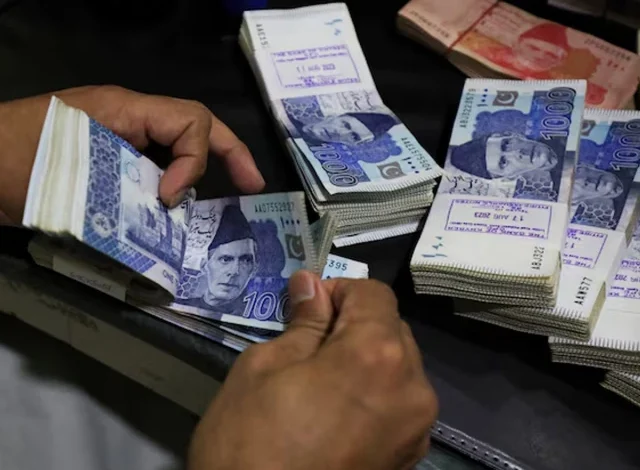Pakistan faces risk of corruption-related money laundering

IMF reports says Pakistan’s anti-money laundering enforcement compromised by political pressure, weak oversight
An employee counts Pakistani rupee notes at a bank in Peshawar on August 22, 2023. Photo: Reuters
The International Monetary Fund has said that Pakistan faces significant risks of corruption-related money laundering, while accountability remains weak, as high-profile or politically sensitive cases often face external interference that limits the independence of investigations.
“Pakistan faces significant risks of corruption-related money laundering. High-risk sectors include banking, real estate, construction, politically exposed persons, and public procurements,” states the Governance and Corruption Diagnostic Report released by the Ministry of Finance on November 19.
The report added that the misuse of corporate vehicles, shell companies, and informal value transfer systems are common techniques used to conceal the origins of corruption proceeds in Pakistan.
The International Monetary Fund (IMF) said judicial constraints have further weakened enforcement outcomes, with delays in prosecution, lengthy trial processes, and low conviction rates reducing the deterrent effect of anti-money laundering (AML) enforcement.
While highlighting the persistent and corrosive nature of corruption in Pakistan, the IMF also acknowledged that shifting demographics — with 60% of the population under the age of 30 — and disruptive communication technologies are reshaping public tolerance for corruption.
“Politicians are recognising that addressing corruption is crucial to addressing citizens’ concerns for better service delivery,” the report noted.
The Fund added that over 60% of Pakistan’s 247 million people are below the age of 30, increasingly urbanised, and active on social media. This emerging demographic is less deferential and more sceptical of government institutions.
“Young people are increasingly likely to vote. These changing dynamics are focusing attention on service delivery, how services are delivered, and who has access to them.”
The IMF said Pakistan has taken some steps to enhance financial sector oversight in line with AML and counter-terrorism financing priorities. Reforms have improved risk-based supervision by financial regulators through targeted on-site and thematic inspections to assess banks’ compliance with AML obligations, particularly in high-risk areas such as Politically Exposed Person (PEP) onboarding and Suspicious Transaction Report (STR) generation.
However, it said “high-profile or politically sensitive cases often face external interference, limiting the independence of investigations and undermining public confidence in accountability mechanisms.”
For corruption-linked money laundering complaints, NAB’s turnaround time is four months just to open a formal enquiry. A complaint must first undergo a rigorous administrative vetting process before an investigation can be launched — a process that often results in complaints not being pursued, the report noted.
The IMF highlighted multiple implementation challenges that hinder full enforcement of the AML framework. These include weak institutional coordination, poor enforcement of preventive measures, and gaps in operational follow-through.
It added that the absence of strong institutional accountability mechanisms has weakened overall system effectiveness. There is no clear framework to assess the performance of authorities in preventing money laundering linked to corruption.
Pakistan informed the IMF that, during 2023–2024, monetary penalties amounting to more than Rs944 million were imposed on 17 banks for money laundering-related violations. But the IMF said public concerns persist regarding the impartiality of key AML enforcement institutions.
“Stakeholders frequently cite concerns about impartiality and selective enforcement of AML obligations, particularly when politically exposed persons or high-level officials are involved.”
“Supervisory and enforcement agencies do not appear to collect or publish disaggregated statistics on corruption-linked suspicious transactions, inspections, investigations, or sanctions,” the report said.
The IMF also commented on the FBR’s capacity to regulate Designated Non-Financial Businesses and Professions (DNFBPs). “The FBR’s capacity to supervise DNFBPs is particularly constrained, given the number of entities under its remit and the limited staff available for inspections and outreach.”
Some DNFBPs — especially in the real estate sector — are considered high-risk for facilitating corruption-based money laundering. Without sufficient staffing and technical expertise, supervision in these areas is likely to remain reactive and inconsistent, the Fund said.
The IMF added that Pakistan’s law enforcement agencies continue to face persistent challenges in pursuing corruption-linked money laundering cases. The NAB and FIA share the mandate to investigate and prosecute corruption-related money laundering, but both agencies often lack sufficient trained personnel in these specialised areas.
Beneficial Ownership remains hidden
Pakistan was required to publish the names of beneficial owners of companies to ensure greater transparency.
“The SECP is responsible for overseeing the beneficial ownership framework and is yet to establish a registry to maintain BO information,” the report added. Verification mechanisms for beneficial ownership data also remain underdeveloped, according to the IMF.
The SECP requires legal entities to declare that beneficial ownership information is maintained at the time of incorporation, upon any change of ownership, and annually. However, the IMF said that actual beneficial ownership information is often not declared, and there is limited evidence of systematic verification or auditing of these disclosures.
The IMF noted that public access to beneficial ownership data is not readily available, which limits transparency and accountability. Although the public may submit a Form-19 declaration to request beneficial ownership information, such approvals are rare, according to the lender.
It added that beneficial ownership data is not publicly accessible in Pakistan, reducing opportunities for independent scrutiny. The Fund further noted that recent amendments to data privacy laws now allow law enforcement agencies to obtain beneficial ownership information.



